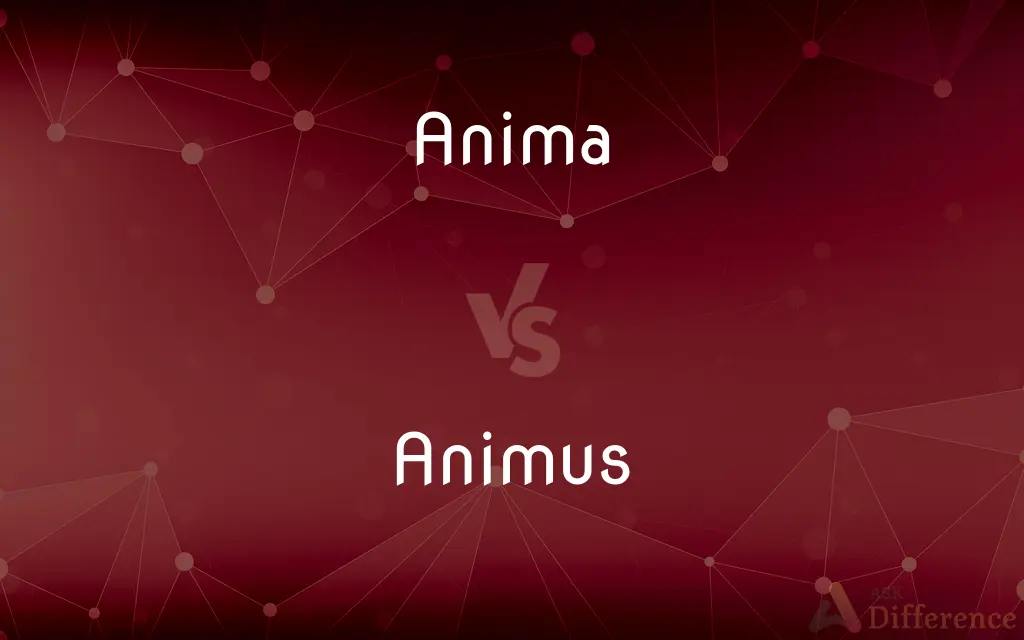Anima vs. Animus — What's the Difference?
By Tayyaba Rehman & Maham Liaqat — Updated on April 16, 2024
Anima represents the feminine aspects of a man's psyche, characterized by emotional depth and intuition, while animus symbolizes the masculine aspects of a woman's psyche, featuring rationality and strength.

Difference Between Anima and Animus
Table of Contents
ADVERTISEMENT
Key Differences
Anima in Jungian psychology is seen as the subconscious feminine side of a man that can influence his emotional life and interactions. On the other hand, animus represents the subconscious masculine side of a woman, impacting her thoughts and logical processes.
The anima is often associated with emotionality and receptivity, qualities traditionally viewed as feminine, whereas animus is linked to assertiveness and logical abilities, traits often considered masculine.
Anima can manifest in a man as a greater sensitivity or a deeper connection to his emotions, while animus might appear in a woman as a drive for reasoning and leadership.
The development of anima in men can lead to a better understanding of their emotions and relationships, on the other hand, the integration of animus in women can enhance their ability to assert themselves and make rational decisions.
Anima and animus, both integral parts of the human psyche, play crucial roles in how individuals relate to the opposite sex; anima shapes a man’s perception of women, while animus influences a woman’s view of men.
ADVERTISEMENT
Comparison Chart
Definition
Feminine inner personality in men.
Masculine inner personality in women.
Associated Traits
Emotionality, sensitivity, intuition.
Rationality, assertiveness, logic.
Influence on Psyche
Influences emotional life and relations.
Influences thoughts and decision-making.
Role in Relationships
Shapes perception of the opposite sex.
Shapes perception of the opposite sex.
Developmental Impact
Leads to emotional depth and empathy.
Promotes leadership and rational choices.
Compare with Definitions
Anima
A man’s soul or inner self, shaped by feminine qualities.
Through therapy, he explored the anima to better understand his emotions.
Animus
The archetype in women that manifests as manly qualities.
Her strategic thinking is often attributed to her animus.
Anima
A psychic counterpart that complements a man’s conscious self.
He felt his anima was at play when he enjoyed the romantic movie.
Animus
A psychic counterpart that complements a woman’s conscious self.
She credited her animus for her decisive leadership.
Anima
The inner feminine aspect of a man in Jungian psychology.
His sudden empathy towards his colleague's situation was a manifestation of his anima.
Animus
The aspect of the psyche that connects a woman to the collective unconscious.
She envisioned a wise old man in her visions, representing her animus.
Anima
The archetype in men that is expressed as womanly qualities.
His nurturing nature is often seen as an expression of his anima.
Animus
The inner masculine aspect of a woman in Jungian psychology.
Her debate skills showcased her well-developed animus.
Anima
The aspect of the psyche that connects a man to the collective unconscious.
His dreams often featured a mysterious woman, symbolizing his anima.
Animus
A woman’s soul or inner self, characterized by masculine traits.
Her assertive approach in meetings reflects her strong animus.
Anima
The unconscious or true inner self of an individual, as opposed to the persona, or outer aspect of the personality.
Animus
A feeling of animosity; ill will.
Anima
The feminine inner personality, as present in the unconscious of the male. It is in contrast to the animus, which represents masculine characteristics.
Animus
An attitude that informs one's actions; disposition or intention.
Anima
(Archaic) The inner self of an individual; the soul.
Animus
In Jungian psychology, the masculine inner personality as present in the unconscious of the female. It is in contrast to the anima, which represents feminine characteristics.
Anima
The soul or animating principle of a living thing, especially as contrasted with the animus.
Animus
(Archaic) The rational soul; the mind.
Anima
(Jungian psychology) The inner self (not the external persona) of a person that is in touch with the unconscious as opposed to the persona.
Animus
The basic impulses and instincts which govern one's actions.
Anima
(Jungian psychology) The unconscious feminine aspect of a person.
Animus
A feeling of enmity, animosity or ill will.
Anima
(Jungian psychology) the inner self (not the external persona) that is in touch with the unconscious
Animus
The masculine aspect of the feminine psyche or personality.
Animus
Animating spirit; intention; temper.
Animus
A feeling of ill will arousing active hostility
Common Curiosities
How does anima influence a man’s perception of women?
The anima shapes a man’s perception of women, often influencing his emotional reactions and attractions.
What is the Jungian concept of anima?
In Jungian psychology, the anima is the inner feminine aspect of a man, influencing his emotions and how he perceives women.
Can anima affect a man’s behavior?
Yes, the anima can significantly affect a man's behavior, enhancing his emotional understanding and relationships.
Can a man's anima be negative?
If unbalanced, the anima can manifest in negative traits like moodiness or emotional instability.
What role does anima play in men’s dreams?
In dreams, anima can appear as various female figures, offering guidance or representing parts of his psyche that need attention.
How does animus manifest in a woman?
The animus in a woman manifests as masculine traits like assertiveness and logical thinking, influencing her decision-making.
Is the animus always beneficial for a woman?
While generally beneficial, an overdeveloped animus can lead to overly aggressive or rational behavior, overshadowing other important emotional aspects.
What are the benefits of integrating animus in a woman’s psyche?
Integrating the animus can help a woman develop leadership qualities and make more rational decisions.
How does one develop their anima or animus?
Development involves embracing and integrating these aspects through self-awareness, therapy, and exploring interpersonal relationships.
How are anima and animus different from one's biological sex?
Anima and animus are psychological constructs representing masculine and feminine traits, respectively, and do not necessarily align with one’s biological.
How does animus affect a woman’s relationships?
Animus can influence a woman's interactions, particularly with men, affecting her assertiveness and the way she communicates.
Are anima and animus only relevant to heterosexual individuals?
No, these concepts are relevant to individuals of any sexual orientation, influencing their psychological and emotional makeup.
Can animus appear in a man's psyche?
Typically, animus is specific to women, but men may also exhibit traits traditionally associated with the animus, such as rationality, which Jung might attribute to other archetypal influences.
What does a well-integrated anima look like in a man?
A well-integrated anima in a man results in emotional depth, empathy, and a balanced understanding of both masculine and feminine qualities.
How does culture impact the development of anima and animus?
Cultural norms and values can shape how and to what extent anima and animus are expressed and accepted in individuals.
Share Your Discovery

Previous Comparison
Salutation vs. Valediction
Next Comparison
Ding vs. PingAuthor Spotlight
Written by
Tayyaba RehmanTayyaba Rehman is a distinguished writer, currently serving as a primary contributor to askdifference.com. As a researcher in semantics and etymology, Tayyaba's passion for the complexity of languages and their distinctions has found a perfect home on the platform. Tayyaba delves into the intricacies of language, distinguishing between commonly confused words and phrases, thereby providing clarity for readers worldwide.
Co-written by
Maham Liaqat















































